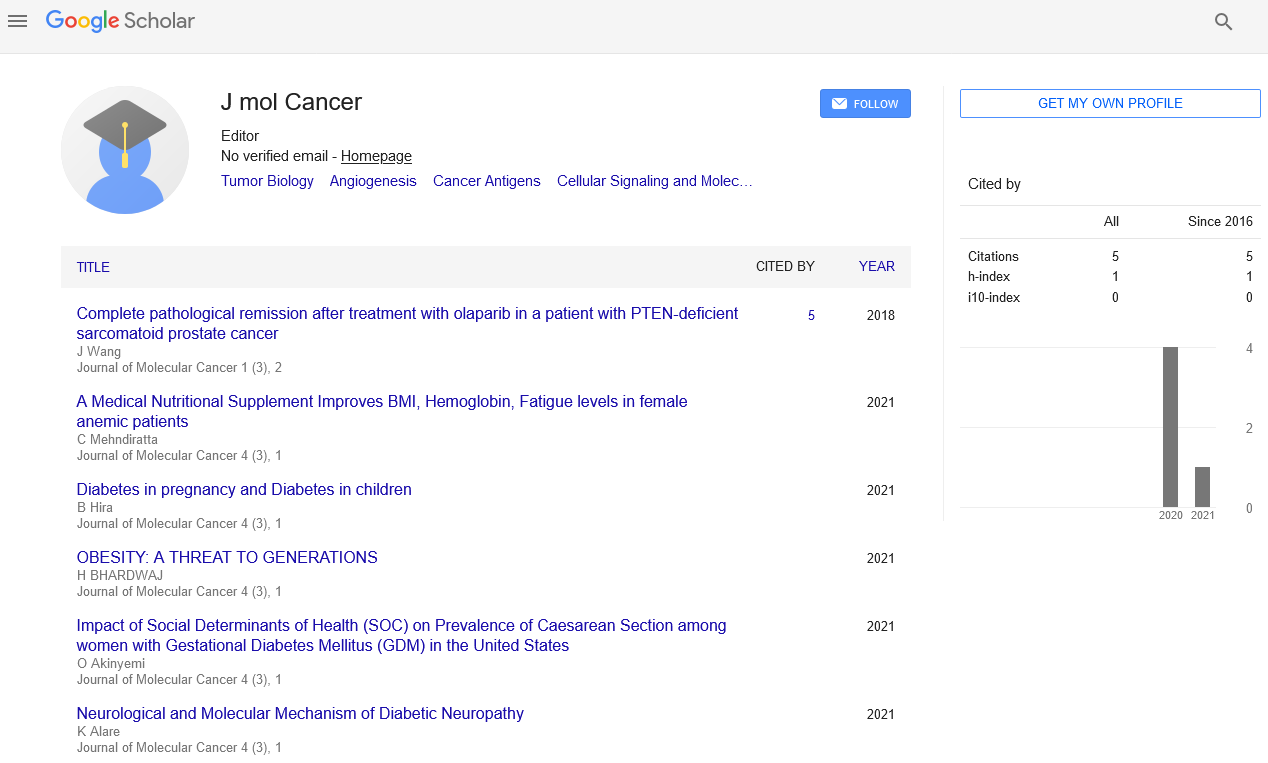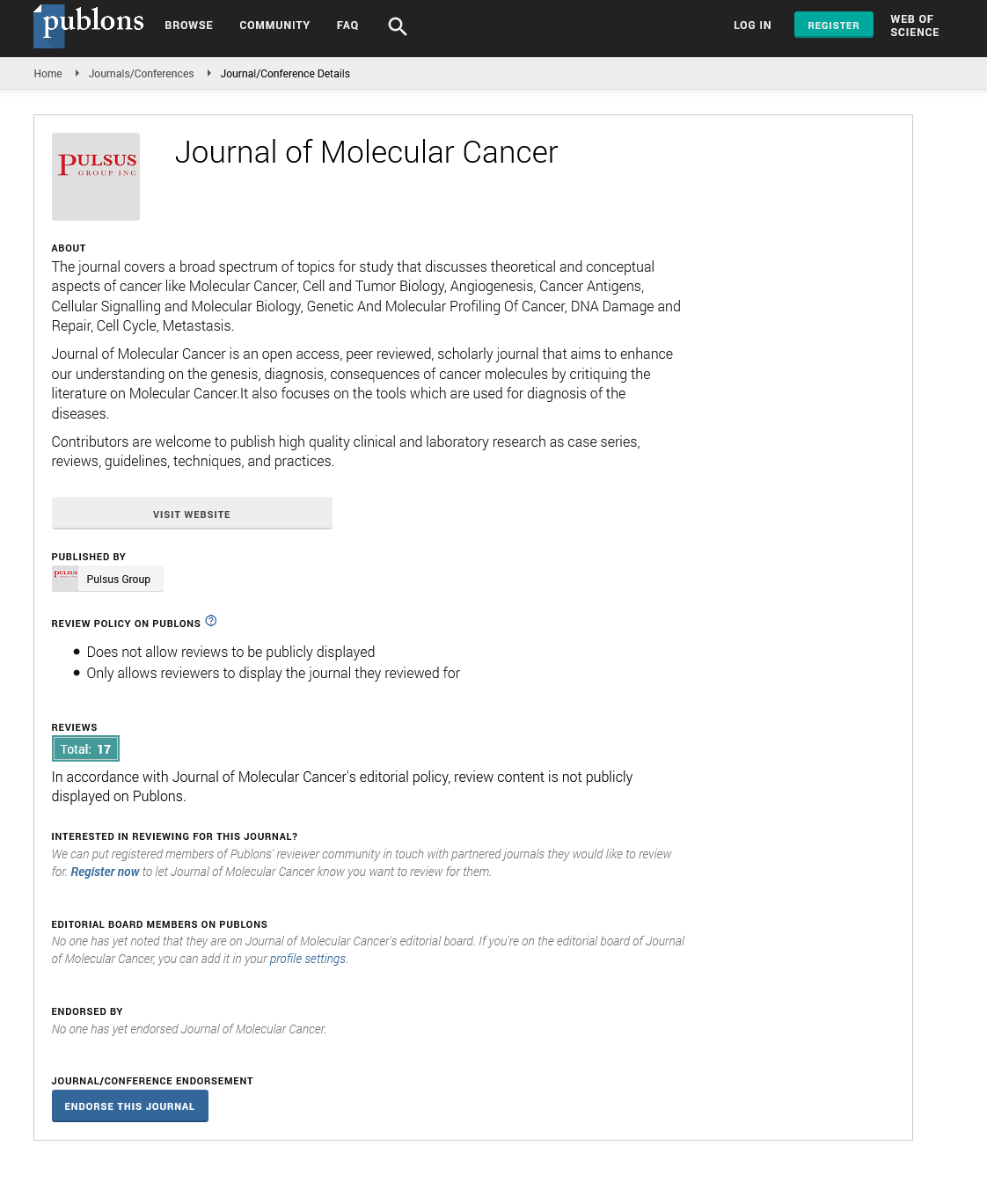Oncogenes: Mechanisms impact and therapeutic strategies in cancer
Received: 17-Dec-2023, Manuscript No. puljmc-24-7148; Editor assigned: 19-Dec-2023, Pre QC No. puljmc-24-7148; Accepted Date: Jan 22, 2024; Reviewed: 07-Jan-2024 QC No. puljmc-24-7148; Revised: 14-Jan-2024, Manuscript No. puljmc-24-7148; Published: 24-Jan-2024
Citation: Salgado G. R. Oncogenes: Mechanisms, impact and therapeutic strategies in cancer. J Mol Cancer. 2024; 6(1):1-2.
This open-access article is distributed under the terms of the Creative Commons Attribution Non-Commercial License (CC BY-NC) (http://creativecommons.org/licenses/by-nc/4.0/), which permits reuse, distribution and reproduction of the article, provided that the original work is properly cited and the reuse is restricted to noncommercial purposes. For commercial reuse, contact reprints@pulsus.com
Abstract
Oncogenes are pivotal in the development of cancer, representing mutated or aberrantly expressed versions of normal genes (proto-oncogenes) that drive uncontrolled cell growth and tumorigenesis. This article explores the fundamental roles of oncogenes in cancer biology, including their mechanisms of action, impact on cellular pathways, and contributions to various cancer types. We also review significant advancements in understanding oncogenes, the development of targeted therapies, and the future directions in oncogene research. By elucidating the molecular underpinnings and therapeutic potentials of oncogenes, this article aims to provide insights into how these discoveries are shaping contemporary cancer treatment and research.
Key Words
Oncogenes; Proto-oncogenes; Tumorigenesis; Genetic mutations; Signal transduction; Targeted therapy; Cancer genetics
Introduction
Cancer is a multifaceted disease characterized by uncontrolled cell proliferation and the ability to invade surrounding tissues. At the molecular level, cancer is often driven by genetic alterations that disrupt normal cellular functions. One of the central players in this process is the oncogene, a mutated or overexpressed version of a normal gene known as a proto-oncogene. Oncogenes drive cancer development by promoting aberrant cell growth, survival, and proliferation.
The study of oncogenes has revolutionized our understanding of cancer biology and has led to the development of targeted therapies that specifically address the molecular abnormalities associated with these genes. This article provides a comprehensive overview of oncogenes, detailing their mechanisms of action, impact on cancer development, and the progress made in therapeutic strategies targeting oncogene-driven cancers.
Mechanisms of oncogene action
Oncogenes are derived from proto-oncogenes, which are normal genes that regulate key cellular processes such as growth, differentiation, and survival. Mutations or dysregulation of protooncogenes can convert them into oncogenes, leading to uncontrolled cellular behaviors. Oncogenes can influence cancer development through several mechanisms:
Gene amplification involves the increase in the number of copies of a gene. Amplification of oncogenes can lead to their overexpression,resulting in enhanced signaling and tumorigenesis. A classic example is the amplification of the myelocytoma oncogene, which encodes a transcription factor that drives cell proliferation. MYC amplification is associated with various cancers, including Burkitt lymphoma and breast cancer.
Point mutations are single nucleotide changes in the DNA sequence that can alter the function of a gene. In oncogenes, these mutations can lead to constitutive activation of signaling pathways. For instance, mutations in the RAS gene family (e.g., Kristen Rat Sarcoma Viral oncogene homolog (KRAS, NRAS)) result in constitutively active Ras proteins, which continuously promote cell growth and survival. These mutations are commonly found in cancers such as pancreatic, colorectal, and lung cancers.
Impact of oncogenes on cancer development
Oncogenes play a critical role in the initiation and progression of cancer by disrupting normal cellular processes. Their impact on cancer development can be seen in several ways:
Oncogenes often drive uncontrolled cell proliferation by activating signaling pathways that promote cell division. For instance, the overexpression of Cyclins or Cyclin-Dependent Kinases (CDKs) can lead to dysregulation of the cell cycle, resulting in excessive cell growth. Oncogenes can inhibit apoptosis (programmed cell death), allowing cancer cells to survive despite genetic damage. For example, overexpression of anti-apoptotic proteins like Bcl-2 can protect cancer cells from undergoing apoptosis, contributing to tumor persistence and resistance to therapy.
Oncogenes can also promote angiogenesis, the formation of new blood vessels that supply nutrients to tumors. For instance, the overexpression of Vascular Endothelial Growth Factor (VEGF), often driven by oncogenic pathways, can enhance tumor growth and metastasis by increasing blood supply to the tumor.
Advancements in understanding oncogene
Recent advancements in genomics and molecular biology have greatly enhanced our understanding of oncogenes and their role in cancer: High-throughput genomic sequencing technologies, such as NextGeneration Sequencing (NGS), have allowed for the comprehensive identification of oncogenic mutations and their prevalence in various cancers. These technologies have revealed novel oncogenes and provided insights into the genetic heterogeneity of tumors.
Functional genomics approaches, including RNA interference (RNAi) and CRISPR-Cas9 gene editing, have been used to investigate the role of specific oncogenes in cancer. These tools enable researchers to manipulate oncogene expression and assess their effects on cellular behaviors and tumorigenesis.
The identification of oncogenes has led to the development of targeted therapies that specifically inhibit the aberrant signaling pathways driven by these genes. For example, tyrosine kinase inhibitors (e.g., imatinib) target the BCR-ABL fusion protein in CML, while EGFR inhibitors (e.g., erlotinib) target mutated EGFR in Non-Small Cell Lung Cancer (NSCLC).
Future directions in oncogene research
Ongoing research aims to further elucidate the complex roles of oncogenes in cancer and to develop more effective therapeutic strategies:
Combining targeted therapies with other treatment modalities, such as chemotherapy or immunotherapy, is being explored to enhance treatment efficacy and overcome resistance. For example, combining tyrosine kinase inhibitors with immune checkpoint inhibitors may offer synergistic effects in some cancers. Resistance to targeted therapies is a major challenge in oncology. Research is focused on understanding the mechanisms of drug resistance and developing strategies to overcome it. This includes identifying secondary mutations that confer resistance and developing next-generation inhibitors to address these challenges.
Conclusion
Oncogenes play a crucial role in the development and progression of cancer by driving uncontrolled cell growth and disrupting normal cellular processes. Understanding the mechanisms through which oncogenes contribute to cancer has led to significant advancements in targeted therapies and personalized medicine.
As research continues to explore the complexities of oncogenes and their impact on cancer biology, new therapeutic strategies and technologies will emerge to address the challenges of cancer treatment. By leveraging these advancements, researchers and clinicians can work towards more effective and precise approaches to combat cancer and improve patient outcomes. The ongoing investigation of oncogenes and their role in cancer remains a vital area of research with the potential to revolutionize cancer care and provide hope for patients worldwide.






